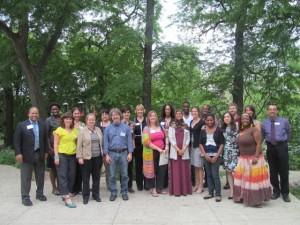Hey, RU students! Want to improve your research skills in order to find great sources for your academic work, whether in print or online? If so, your timing’s perfect, since my colleague Katy Hite, instructional librarian at RU, is running some great student workshops next week. Here’s the skinny:
Category: Education
A Modest Plan to Reduce Gun Violence
After a week of deafening silence following the Newtown massacre, the National Rocket-launcher Association at last rolled out its new school safety strategy: placing an armed security guard in every American school. This is supposedly because “the only thing that can stop a bad guy with a gun is a good guy with a gun,” as noted by NRA vice president Wayne LaPierre.
In other words — surprise! — we need more guns.

(“Best deals on guns and ammo posted by users”)
The trouble is, this Wild West-inspired idea isn’t very creative or original. And it’s bound to be expensive, what with paying for the security guards’ salaries, insurance, training, equipment, medical treatment (after in-school gun battles gone awry), and the occasional funeral.
Alternatively, we might consider other slaughter-reduction strategies that don’t involve turning our schools into quasi-military installations. Something like this one, which I just thought up. I call it A Kindergartner in Every Gun Shop.

My plan’s a little different from the NRA’s approach in that its ultimate goal is fewer guns in circulation rather than more. Better yet, as a voluntary community service program staffed by five- and six-year-olds, it’s free.
Here’s how it would work. Every kindergarten class in America would be assigned to a gun shop, ammo dealer, firing range, or firearms expo somewhere in the community. Parents and teachers would develop a schedule for the students to monitor each gun-related location — with one kid at a time working a morning, afternoon, or evening shift — during business hours. Yes, each child would miss a little school every month, but the public-service experience would be mighty educational.
Customers would be required to do a fifteen-minute “kindergartner check” before buying guns or ammunition. This would involve looking into the eyes of the child, who then asks the adult a series of standard questions, such as “Do you know how many people in Illinois die each year from gun violence?” and “Do you really need yet another assault rifle for your collection?”
Assuming the customer still desired to make a purchase, the kindergartner would then run though some basic guidelines on gun safety, including “Don’t bring your gun to school and shoot at teachers”; “Never let your surly teenage son mess with your semi-automatic rifle after playing excessively violent video games“; and “Don’t point your pistol at your face to demonstrate the safety mechanism, because it might fail and you’ll blow your head off.”
Skeptics might quibble that elementary schoolchildren aren’t truly qualified to lecture adults on gun ownership and safety, since most of them are still learning their letters and numbers. (The kids, I mean.)

True, but kindergartners are really good at talking, not to mention the educational technique of “show and tell.” Some of them, particularly in crime-plagued cities like Chicago and Joliet, could offer real-life lessons in how their older relatives died in gun battles, or shot themselves accidentally, or got thrown in jail from blasting someone else. Such anecdotes can really liven up an otherwise dry lecture on firearm safety.
I see one drawback to my plan, though. Assume that the many thousands of gun dealers in our country are each open for 50-60 hours per week. Even with little Sally and Bobby pulling double shifts at their local bazooka retailer, those are a lot of business hours to cover.
I’m a little worried that at the rate that children are getting mowed down these days in our schools, we won’t have enough kindergartners to go around.
A version of this essay (“Put a Kindergartner in Every Gun Shop“) appeared as my monthly op-ed column in the Joliet Herald-News on 4 January 2012.
Equitable Education = a Strong Economy
The recent Chicago Teacher’s Union strike has exposed a long list of contentious issues in our K-12 educational system. The most troubling of these is the glaring inequity among our region’s public schools.
Nowhere is this more evident that in Chicago’s District 299, where a small percentage of children enjoy a world-class education at one of the District’s vaunted selective enrollment schools, while most students languish in understaffed and overwhelmed neighborhood schools surrounded by violence and economic stagnation. It also applies to our state as a whole, which is ranked among the worst in the nation by the Education Law Center in their recent report cards on public school funding equity.
This long-entrenched divide between the educational haves and have-nots not only mirrors the gulf between rich and poor in American society, it also replicates and reinforces these socioeconomic inequities. You don’t need a PhD to know that students from disadvantaged schools are less likely to graduate, go to college, and get good jobs, and (not incidentally) stay out of prison.
The source of this inequity is equally obvious. Since local property taxes provide the lion’s share of funding for America’s school districts, the resources (and therefore the quality) of the schools are directly proportional to the wealth of their community.
Schools in big-money districts have all the bells and whistles: small class sizes, good facilities, broad offerings in languages and the fine arts, and gifted learning programs. Meanwhile, impoverished districts limp along with overcrowded classrooms, out-of-date technology, bare-bones curricula, and overstretched faculty. (The metal detectors are state-of-the-art, though.)
This is not right. It’s not acceptable for a kid’s educational future to be determined simply by where she was born. And it darn well needs to change.
That’s because the fates of our economy and educational system are inextricably linked. When the economy tanks, we unwisely respond by slashing public education funding — cutting programs, firing teachers, closing schools. State and federal support for K-12 education has steadily deteriorated. But this misguided strategy merely guarantees more economic problems down the line, as we end up with poorly-educated citizens who are not college-ready and cannot compete for good entry-level jobs, let alone start businesses and become “job creators” themselves.
Here’s an alternative plan. Let’s invest in two critical pillars of K-12 educational excellence that every high-achieving school district in America takes for granted: small class sizes and rich curricular offerings. We do it by (1) hiring tens of thousands of teachers for overpopulated schools, and (2) building additional classroom space where needed. This initiative would put people to work by creating superior learning environments for our kids.
Instead of just emphasizing crowd control in classrooms of 30 children (the standard class size in Joliet’s District 86), teachers could do meaningful work with groups of 18-22, thus giving kids exponentially more time and quality instruction. Every school, not just the richest 1%, would have foreign language from kindergarten onward, full-time art and music teachers, a school garden linked to the science and health curriculum, and gifted education for students who need greater challenge.
Citizens of wealthy school districts don’t consider these things “luxuries,” but rather absolute necessities. So why is it acceptable to us as a nation that so many of our schools do without?
Let’s get our professional educators and our tradespeople back to work building a better, more equitable educational system. There is no more important investment in our future that we can make.
A version of this essay appeared as my op-ed column, “Equitable Education Equals a Strong Economy” in the Sunday, 23 Sept 2012 edition of the Joliet Herald-News (p25).
Project Exploration: Re-thinking Environmental Science
Last month I was invited to participate in a brainstorming session at the Peggy Notebaert Nature Museum in Chicago about kids and environmental science. The event brought together educators, environmental professionals of various stripes, and students to discuss how to make environmental science more accessible and relevant to minority boys and girls, particularly kids in the Chicago Public School system. The organization responsible for this effort is Project Exploration, a non-profit dedicated to increasing female and minority participation in science early on in the educational pipeline: specifically, in junior high and, to a lesser extent, high school.
Jameela Jafri was the dynamo behind this convening, at which I met many exciting and impressive people from all corners of Chicago. Check out her blog post about the event here, and visit to the Project Exploration website to learn more about the amazing stuff they do.
Last Workday this Spring at Chicago Lights Urban Farm
Last Wednesday, May 2nd, was a bittersweet day in my SUST 350 Service & Sustainability class at RU. Since March 21st we had convened every Wednesday afternoon at 3pm at the Chicago Lights Urban Farm in the Cabrini-Green neighborhood of Chicago. For our first hour we’d discuss the week’s readings and then have student-led “farm reports” on urban agricultural operations across the US. Then we’d put away our books and grab some tools to work from 4-5:30pm doing whatever farm chores needed doing that day. During this latter part of our class sessions, we labored side by side with several Growing Power staff and the neighborhood teens who work as Youth Corps job interns here during the school year and summer.
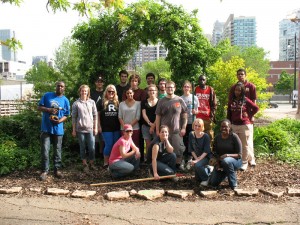
In the process we began to get the rudiments of a working knowledge of the half-acre urban farm here at the corner of Hudson Street and Chicago Avenue in this rapidly gentrifying neighborhood that is still home to many poor and working-class citizens, despite the demolition of most of the Cabrini-Green public housing in the area. (The original Cabrini rowhouses remain just to the north of the farm, though their fate is uncertain.) We learned how to turn over and then utilize compost; appreciated the basic mechanisms of vermicomposting (using worms to break down organic waste and produce nutrient-rich soil consisting of worm castings); mastered the art of handling a power drill; and depended upon the value of teamwork when it comes to weeding, hoeing, raking, shoveling and hauling wood chips, repairing compost bins, and picking up litter.
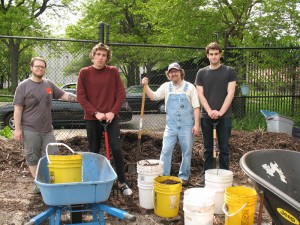
The past couple of weeks, workers at the farm (including us) have been chipping away at a major construction project: a new hoop house to accompany the one now standing near the middle of the farm property.
Last week we made major strides toward that goal, as we helped finish the wooden foundation/frame of the structure and secured it to the ground. Some of us put together lengths of strong but lightweight aluminum poles (itself a simple yet tricky process to get right without injuring a finger), then cut them to length.
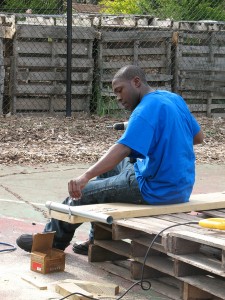
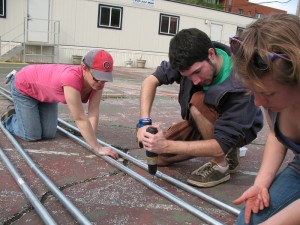
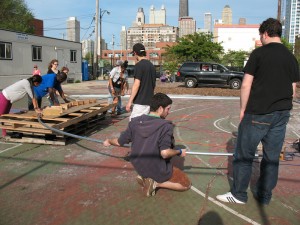
Finally, in the waning minutes of our semester in the late afternoon, we bent two of the poles using a special wooden jig in a well-choreographed ballet of pushing and steadying, and then mounted one of the hoops at the west end of the house. A great cheer went up when this happened, and I felt it a fitting moment on which to conclude our semester: for even as we enjoyed this sense of accomplishment, we knew that the job was far from done. As we said our goodbyes and dispersed in separate directions back to school or home, our Growing Power Youth Corps compatriots at the farm began taking over right where we left off.
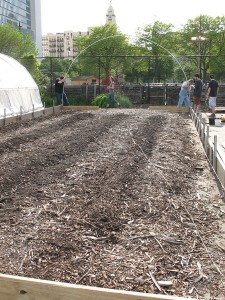
That’s yet another great thing about this service learning experience: it doesn’t end here, even though our spring semester is nearly over. The Chicago Lights Urban Farm welcomes volunteers every Saturday from 10am to 4pm, and I know many of us will return to this friendly and welcoming spot to do some more work with our new friends. As for me, I’m already looking forward to setting up v2 of this course next spring, for it’s the hope of the Sustainability Studies program at Roosevelt to cultivate a long-term relationship with the Chicago Lights and Iron Street urban farms here in the City of Big Shoulders — now one of the great urban agricultural frontiers of North America.
Special thanks go to many people, including:
- Natasha Holbert, director of the Chicago Lights Urban Farm, who was instrumental in the planning for SUST 350, and who provided valuable insights and enthusiastic guidance to us every step of the way;
- Lauralyn Clausen (Education and Curriculum Coordinator and Youth Corps Co-Instructor) Brian Ellis (Youth Corps Co-Instructor), Malcolm Evans (Farm Assistant), and Laurel Simms (Chicago Production/Marketing Manager and Farm Educator) — the Growing Power urban farmers in Chicago who led our daily work sessions, imparted their knowledge, and made us feel welcome from the get-go;
- The Youth Corps job interns (Deja, Henry, Ivory, Jonathan, Kyra, Monique, Quentin, Rayshard, Rayshaun, Sam, and Toni) with whom we worked, joked, and took some cool field trips to Milwaukee and the Chicago River;
- Amy, our phenomenal tour guide at Growing Power’s Milwaukee farm site;
- Erika Allen, director of Growing Power’s Chicago operations across the city and National Outreach Manager, whose visionary leadership is helping make Chicago a greener and healthier city;
- The faculty and staff of Roosevelt University’s Mansfield Institute, who supported this course will a Transformational Service Learning grant;
- And last but not least, my students who were curious enough to sign up for the inaugural section of this class, who worked hard inside and outside of the classroom from Week one through fourteen, and who had no problem handling worms or getting dirty (in fact, I think they rather enjoyed it!)
Here’s to a splendid growing season this summer and a record-breaking harvest next fall!
For an up-close look at our last workday at the farm this spring, check out this online photo album of our last workday (pictures by SUST major Allison Mayes and yours truly).
Summer Institute on Sustainability and Energy at UIC
The Summer Institute on Sustainability and Energy (SISE) at the University of Illinois at Chicago is an intense interdisciplinary program for graduate and senior-level undergraduate students. From August 9-17, participants from diverse academic backgrounds will be immersed in a broad spectrum of sustainability and energy related topics: policy, economics, health, science, engineering, environment, urban planning, business, and entrepreneurship.
 Senior SUST major Jeff Wasil, who works as an environmental engineer and who will graduate from RU this spring, was accepted to last summer’s Sustainability Institute at UIC. Jeff was part of an interdisciplinary research team of undergrad and grad students who designed and proposed an “intelligent sewer system” meant to reduce Chicago’s stormwater runoff. The team’s final presentation can be viewed here:
Senior SUST major Jeff Wasil, who works as an environmental engineer and who will graduate from RU this spring, was accepted to last summer’s Sustainability Institute at UIC. Jeff was part of an interdisciplinary research team of undergrad and grad students who designed and proposed an “intelligent sewer system” meant to reduce Chicago’s stormwater runoff. The team’s final presentation can be viewed here:
Wasil et al. UIC Inst Presentation Sum2011 (pdf) (4MB file — right-click to save to your computer first)
The theme of the SISE 2012 program will be “Election 2012: Energy, Economics and Environment.” Using the presidential election as the point of departure for a critical analysis of national energy and sustainability issues, students will be enveloped in discussions about national challenges such as energy security, economic recovery and growth, US competitiveness, and climate change. Students will divide into teams to propose innovative solutions that rely on combinations of technology, policy and entrepreneurship. The positions of the two political parties are likely to be quite distinct and the public debate lively, providing ample inspiration and engagement for the SISE2012 program. Following its treatment of US energy needs and perspectives, SISE will turn to world energy, addressing the energy relationships between the US and other regions and nations.
Admission to the Summer Institute is highly competitive with only eighty open seats. Students from across Chicago and the country are invited to apply. Prospective students are asked to submit an application and resume for consideration.
UIC is accepting applications from now until the beginning of June. Find out more information here, or contact Thomas Lipsmeyer at (talaan@uic.edu) for questions concerning the program.
Sustainability Internship Deadline Extended to 4/16
This semester my SUST 210 honors class is working on a community-based research project in collaboration with the Chicago non-profit organization, The Institute for Cultural Affairs, based in Uptown. Along with students from several other Chicago colleges and universities, we are researching and mapping sustainability initiatives throughout each of the city’s 77 community areas. The work continues this summer, so the ICA is seeking motivated and interested students for 40 unpaid internships on this tremendous and valuable city-wide project. Here are the details! — Mike Bryson
Application deadline now extended to Monday, April 16, 2012
The ICA Summer Internship Program, “Accelerate 77” is an opportunity for undergrad and graduate students to participate in preparations for the September 15, 2012 Share Fair event that will highlight, connect and accelerate local sustainability initiatives at the community level throughout Chicago neighborhoods. During the 2011-2012 academic school year, 180 students from six Chicago-based universities have participated in the first phase of the Accelerate 77 project by doing fieldwork in 54 of the 77 Chicago community areas. This summer, students will have the opportunity to take the Accelerate 77 project to the next level developing their skill-set through hands-on community based projects and acquiring skill in facilitation and enabling participatory group processes.
This spring ICA will be interviewing for 40 intern positions – flexing the program timetable between June and August. The positions range from:
* community documentation and engagement of sustainable initiatives,
* designing and planning the September 15th event celebrating the 231 initiatives (three initiatives from each of the 77 communities),
* marketing and public relations for the Accelerate 77 project and share fair event, and
* website support for the community documentation, interchange and post-event collaboration.
Out of the 40 intern positions, the program will offer eight students an intensive leadership development course that will provide hands-on experience of co-leading teams in collaboration with eight ICA resource guides.
More information on leadership development opportunities and the Accelerate 77 project can be found at this page on the ICA website.
New application deadline: Monday, April 16th, 2012
For more information, check out these documents:
Nina Winn
ICA Program Coordinator
nwinn@ica-usa.org
Office: 773.769.6363, ext 301
Karen Snyder
ICA Volunteer and RU alum
snyder@consultmillennia.com
Home office: 773.506.2551
Cell: 773.758.2551
Gardening for Life: Lessons from Hufford Jr. High
I’ve met Doris Hamm only once, but she’s already one of my heroes. She’s started something here in Joliet that’s going to change the world, one school and one kid at a time.
Hamm is a teacher’s assistant at Joliet’s Hufford Junior High School in Darren Raichart’s “Life Skills” class for cognitively-challenged students. She is the architect of a truly extraordinary project: a vegetable garden in Hufford’s courtyard run by her Life Skills students, who have fun getting dirty and learning hands-on gardening techniques, food preparation and cooking skills, and practical lessons in science, math, and economics.
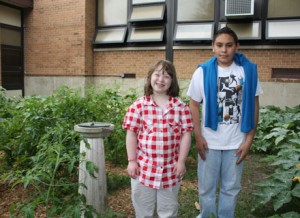
Hamm likens this sustainable experiential learning process to fishing. “It’s like the old Bible story goes,” she told me. “If you give someone a fish, you feed them for a day. If you teach them to fish, you feed them for a lifetime.”
Her students are eating it up. During my visit in the fall of 2009 to Hufford’s Life Skills classroom, the kids eagerly showed me pictures of their garden and told me about their experiences. Some struggled merely to say their names; but their enthusiasm for and knowledge about their garden was nothing short of phenomenal.
In the spring of 2009, the garden’s inaugural year, Hamm and her charges sowed $28 worth of vegetable seedlings. Their diverse array of crops included green beans, peas, tomatoes, broccoli, collard greens, cucumbers, peppers, onions, cabbage, and zucchini.
The kids tended their garden through the summer growing season by watering, pulling weeds, and harvesting food. Later, they used their vegetables in recipes and froze their excess bounty. When Thanksgiving, they cooked a feast made from the organic produce they grew, processed, and preserved themselves.
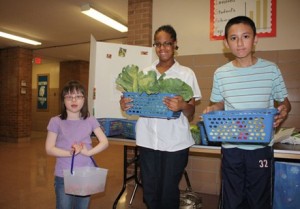
Most amazingly, the Life Skills students ran three farmer’s markets in the hallways of Hufford in the fall of 2009. Strategically timed for payday, the markets proved a huge hit among faculty and staff, and made over $300 collectively — a stunning 980% return on their initial investment. Green venture capitalists, take note!
This success has stoked great plans for coming years. Hamm and her student-gardeners hope to significantly expand their courtyard plot, dedicate part of their harvest to local charities, expand their farmer’s market operation, consider ways to supply the school cafeteria with fresh in-season vegetables, and include many more students in this incredible hands-on learning experience.
Based on what I’ve seen so far, I know they’ll make it happen. After all, they’re not just learning to plant seeds or pull weeds. They’re gardening for life.
This essay was originally published as an op-ed column in the Joliet Herald-News on 5 November 2009. The Hufford courtyard garden has expanded as of March 2012, and the children there are busy planning their 2012 planting and growing season.
The garden project now involves several groups of kids from this urban middle school of almost 1,100 students, including those in Hufford’s Independent Education magnet program as well as those with chronic behavior problems who are learning to work side-by-side with their peers in a peaceful and respectful manner and, in the process, forging friendships with their developmentally-disabled peers.
For more information about school gardens and improving school lunch programs, check out the Illinois Nutrition Education and Training Program.
Urban Agriculture in Joliet
The phrase “urban agriculture” might seem like an oxymoron. But this burgeoning social and economic movement is revolutionizing food production, land use, K-12 education, and community development in big cities like Chicago, Detroit, and Oakland. But smaller cities like my hometown of Joliet have an opportunity to vault to the vanguard of urban agricultural innovation, if they just seize the day.
This spring some of my Roosevelt University students and I work Wednesday afternoons at the Chicago Lights Urban Farm, a small but incredibly productive operation in the Cabrini-Green neighborhood on Chicago’s Near-North Side.
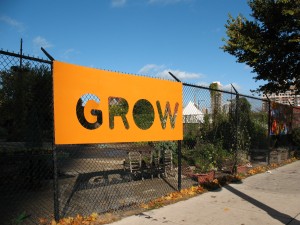
This half-acre oasis of green built atop an abandoned basketball court started as a community garden back in 2002. Now, the Chicago Lights staff, volunteers, and local youth interns produce over 100 kinds of vegetables each growing season from this hitherto derelict property.
The Cabrini-Green farm is thus a vital source of freshly grown, organic produce in a place where walking to the nearest supermarket can entail crossing a dangerous gang boundary. It’s also a training ground for local youth in need of practical job skills; a demonstration site for sustainable agricultural techniques; a place of peace in an area pockmarked by poverty and violence; and a means of reconnecting urban folk to the natural world.
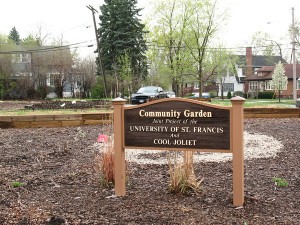
Here in Joliet, various groups have jump-started impressive urban agriculture initiatives lately, including the Cool Joliet / USF community garden project on the near West Side, the Joliet Park District’s new organic community garden opening up on McDonough Street on the far West Side; and Pilcher Park’s community/school garden on the East Side.
One remarkable opportunity waiting to bloom sits smack dab in the city’s center: the huge vacant lot located just west of Joliet Township High School’s Central campus and east of Silver Cross Field. Formerly the site of Rendel’s auto-body repair shop, this expansive grassy parcel is now owned by the high school district and has a yet-to-be-determined destiny.
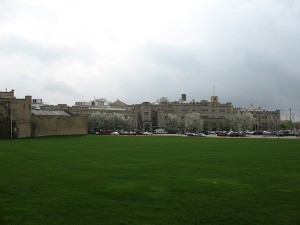
The school district should think big about what this property could be. One ambitious but exciting option is to create an education-focused urban agriculture enterprise for JT Central students that could start small, but eventually scale up and diversify to achieve educational and social impacts that would be unprecedented within the greater Chicago region.
Imagine students, teachers, and staff just walking outside to the farm next door and doing meaningful physical work growing and harvesting organically produced food. Such projects could be fully integrated with the school’s science, social studies, phys ed, business and health curricula, so that students learn from the ground up the ecological, economic, and social benefits of urban agriculture. Imagine their fresh local produce being donated to local food pantries, sold by student entrepreneurs at the Joliet farmers market, and eaten by students in Central’s cafeteria.
I know — it sounds pretty far-fetched. But then again, is it any crazier than believing you can grow food on top of an old basketball court in Cabrini-Green?
This essay was published as “The Revolution of Urban Agriculture” in the 29 March 2012 edition of the Joliet Herald-News. See more pictures of Joliet Central’s open space and the Cool Joliet / USF community garden. Read about the High School for Public Service Youth Farm in Brooklyn, NY, which began in 2010 as a partnership with the nonprofit urban ag organization, bk farmyards.

